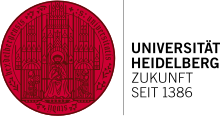
Back Ruprecht-Karls-universiteit Afrikaans Ruprecht-Karls-Universität Heidelberg ALS جامعة هايدلبرغ Arabic جامعة هايدلبرج ARZ Universidá de Heidelberg AST Heydelberq Universiteti Azerbaijani هایدلبرگ بیلیم یوردو AZB Univérsitas Heidelberg BAN Гайдэльбергскі ўніверсітэт Byelorussian Гайдэльбэрскі ўнівэрсытэт BE-X-OLD
Ruprecht-Karls-Universität Heidelberg | |
 | |
| Latin: Universitas Ruperto-Carola Heidelbergensis[1][2][3] | |
| Motto | Semper apertus (Latin)[4] |
|---|---|
Motto in English | Always open |
| Type | Public |
| Established | 18 October 1386 |
| Budget | €764.9 million (2018)[5] |
| Chancellor | Holger Schroeter |
| President | Frauke Melchior |
Administrative staff | 8,397[6] |
| Students | 28,959 (SS2024)[7] |
| Undergraduates | 10,458[7] |
| Postgraduates | 13,410[7] |
| 4,114[7] | |
| Location | , , Germany 49°24′37″N 8°42′23″E / 49.41028°N 8.70639°E |
| Campus | Urban/University town and suburban |
| Colors | Sandstone red and gold |
| Affiliations | German Universities Excellence Initiative, LERU, Coimbra Group, U15, EUA |
| Website | uni-heidelberg |
 | |
| Data as of 2013[update] | |
Heidelberg University, officially the Ruprecht Karl University of Heidelberg (German: Ruprecht-Karls-Universität Heidelberg; Latin: Universitas Ruperto Carola Heidelbergensis), is a public research university in Heidelberg, Baden-Württemberg, Germany. Founded in 1386 on instruction of Pope Urban VI, Heidelberg is Germany's oldest university and one of the world's oldest surviving universities; it was the third university established in the Holy Roman Empire after Prague (1347) and Vienna (1365). Since 1899, it has been a coeducational institution.
Heidelberg is one of the most prestigious universities in Germany.[8] It is a German Excellence University, part of the U15, as well as a founding member of the League of European Research Universities and the Coimbra Group. The university consists of twelve faculties and offers degree programmes at undergraduate, graduate and postdoctoral levels in some 100 disciplines.[9] The language of instruction is usually German, while a considerable number of graduate degrees are offered in English as well as some in French.[10][11]
As of 2021,[update] 57 Nobel Prize winners have been affiliated with the city of Heidelberg and 33 with the university itself.[12] Modern scientific psychiatry, psychopharmacology, experimental psychology, psychiatric genetics, mathematical statistics,[13] environmental physics,[14] and modern sociology[15] were introduced as scientific disciplines by Heidelberg students or faculty. Approximately 1,000 doctorates are completed every year, with more than one third of the doctoral students coming from abroad.[16][17] International students from some 130 countries account for more than 20 percent of the entire student body.[18]
- ^ Record of the Jubilee Celebrations of the University of Sydney. Sydney, New South Wales: William Brooks and Co. 1903. ISBN 9781112213304.
- ^ Records of The Tercentenary Festival of Dublin University. Dublin, Ireland: Hodges, Figgis & Co. 1894. ISBN 9781355361602.
- ^ Actes du Jubilé de 1909 (in Swiss French). Geneva, Switzerland: Georg Keck & Cie. 1910. ISBN 9781360078335.
- ^ "Mission Statement". uni-heidelberg.de. Archived from the original on 17 May 2017. Retrieved 13 April 2017.
- ^ "Daten und Fakten – Finanzen". Universität Heidelberg. Archived from the original on 29 October 2018. Retrieved 26 March 2020.
- ^ "Daten und Fakten – Personal". Universität Heidelberg. Archived from the original on 4 March 2016. Retrieved 26 March 2020.
- ^ a b c d "Studierendenstatistik der Universität Heidelberg". Universität Heidelberg. Archived from the original on 26 May 2024. Retrieved 21 October 2024.
- ^ Schönmann, Jochen (20 October 2007). "Elite-Uni Heidelberg: Der Stolz der alten Dame". Der Spiegel. Archived from the original on 11 December 2022. Retrieved 11 December 2022.
- ^ The university does not include departments of business, visual arts, and engineering, except for computer engineering. For a list of subjects offered see "Subjects offered at Heidelberg University". Heidelberg University (in German). Archived from the original on 27 September 2017. Retrieved 2 October 2010.
- ^ "List of courses on offer at Heidelberg University". Heidelberg University. Archived from the original on 17 September 2017. Retrieved 21 July 2016.
- ^ "Über uns – HEIPAR e. V". Archived from the original on 26 September 2020. Retrieved 17 December 2019.
- ^ Watzke, Christian. "Nobel Laureates affiliated with Heidelberg University – Heidelberg University". www.uni-heidelberg.de. Archived (PDF) from the original on 10 November 2012. Retrieved 17 March 2018.
- ^ Burgmair, Wolfgang; Eric J. Engstrom; Matthias Weber; et al. (2000–2008). Emil Kraepelin. 7 vols. Vol. V: Kraepelin in Heidelberg, 1891–1903 (2005). Munich: Belleville. ISBN 978-3-933510-94-5.
- ^ "Department of Physics and Astronomy". Heidelberg University. Archived from the original on 23 September 2017. Retrieved 26 September 2010.
- ^ Petersen, William. Against the Stream: Reflections of an Unconventional Demographer. Transaction Publishers. p. 24. ISBN 978-1-4128-1666-3.
- ^ "Graduate Academy of the University of Heidelberg". Heidelberg University Homepage. Archived from the original on 15 December 2007. Retrieved 16 May 2008.
- ^ "Interview with Rector Bernhard Eitel – Vorstoss in die internationale Dimension". Rhein Neckar Zeitung online. Archived from the original on 11 April 2008. Retrieved 16 May 2008.
- ^ "Heidelberg Research Magazine Ruperto Carola 1/2004". Heidelberg University Homepage. Archived from the original on 3 March 2016. Retrieved 16 May 2008.